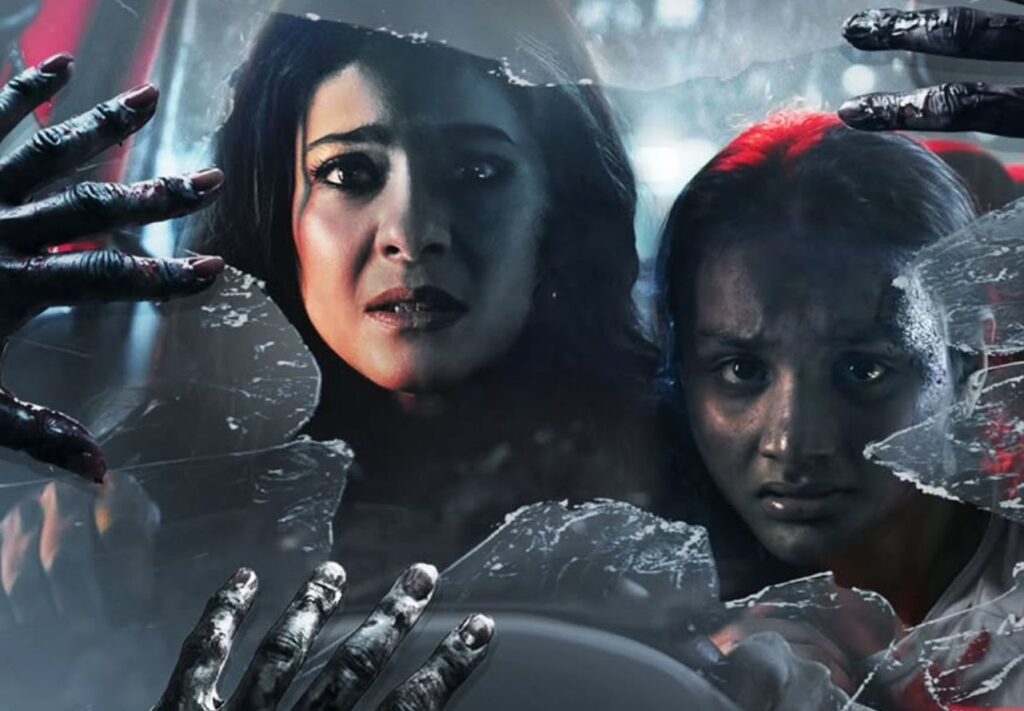Vishal Furia’s Maa firmly places itself in the age-old theme of the battle between good and evil that has long shaped Indian horror stories. Building on familiar ideas of curses and family secrets, the film, unfortunately, leans too heavily on crowd-pleasing moments rather than focusing strongly enough on its narrative.
Shuvankar (Indraneil Sengupta) and Ambika (Kajol) lead a seemingly contented life in Kolkata with their daughter Shweta (Kherin Sharma). Shuvankar has a dark past, rooted in the village of Chandarpur, where he was born with his twin sister. It is a secret he and Ambika have carefully concealed from their twelve-year-old child. Fate intervenes when Shuvankar must return to his ancestral home after his father’s death. There, after completing the last rites, he confides in Joydev (Ronit Roy), the village headman, his desire to sell the cursed estate and tells him to find a broker. Tragically, on his journey back, Shuvankar falls victim to the malevolent forces tied to his family’s legacy, though the police dismiss it as an accident. Four months later, Joydev informs Ambika that a broker has been found and urges her to return to Chandarpur to fulfil her late husband’s final wish. Hesitant but bound by duty, Ambika agrees and allows Shweta to accompany her. But both of them are unaware that it is going to be an ominous journey with a lurking menace…
Maa adheres almost religiously to the standard commandments of its genre. It begins, as so many do, with a cursed Bengali zamindar mansion steeped in secrecy. It populates its frames with ominous figures skulking in the background to manufacture dread, and leans heavily on sudden bursts of background score to trigger jump scares. The result is a patchy film that struggles to balance a slackened pace with forced moments of urgency. Beyond drawing a superficial link to goddess Kali and her mythic battle with a doitya (demon), the film offers little justification for setting this tale in Bengal. This is especially glaring, given the rich trove of Bengali horror and folklore, which brim with psychological complexity and genuine terror that Maa pointedly ignores. In doing so, it loses the deeper tension and moral weight that its story could have explored.
Saiwyn Quadras’ screenplay unfolds less like a carefully woven narrative and more like a loosely connected flow chart with scattered plot points. Scenes drift by with motivations that are neither fully convincing nor emotionally charged. The long-held secret that Ambika finally reveals to Shweta is stripped of any textured complexity that might have deepened this pivotal moment. Elsewhere, the sudden intervention of the old caretaker (Dibyendu Bhattacharya) feels more like a perfunctory device than a natural turn of events. The introduction of a police inspector serves little purpose beyond propping up the plot, offering no real dramatic weight. Even the climactic Kali Pujo, staged with a hollow grandiosity, undercuts the sense of rising dread we might have expected as it hijacks the suspense with spectacle that feels oddly disconnected from the film’s build-up for the showdown.
Furia certainly finds opportunities to exhibit his flair for horror. He delivers a handful of VFX-driven moments that achieve a brief chilling potency. The discussion of menstrual periods between mother and daughter is handled with sensitivity. There’s even a striking scene near the film’s climax where Ambika is forced to confront a decision that could have pushed Maa toward a far darker place. Had Furia not ultimately pulled back, it would have given the film an interestingly unsettling conclusion. But sporadic sharp execution is no substitute for weak content. And that is precisely where Maa falters. The introduction of a principal character from Shaitan, a prior Devgan Films production, at the end feels much too strained to forge a cinematic universe.
Kajol’s performance is anchored in a quiet maturity that lends the character genuine emotional heft. She is particularly compelling in the climax, where vulnerability merges seamlessly with bursts of action. Indraneil Sengupta’s presence in the film is brief and leaves little room to make a lasting impact. Kherin Sharma and Roopkatha Chakraborty as Dipika, who becomes the young target of the demon, deliver earnest performances. Ronit Roy’s Joydev exudes an intriguing warmth and brings a certain gravitas to his character. Though it’s undermined by his stilted Hindi delivered in a forced Bengali accent. Several supporting actors, too, fall into the same trap, a lingering affliction of Bollywood’s approach to supposedly regional authenticity.
Pushkar Singh’s cinematography, much like the film’s visual effects, offers little beyond the standard palette of horror clichés. Sandeep Francis’s editing works hard to impose a rhythm on an otherwise lifeless script, injecting brief pulses of momentum where it can. Lochan Pratap Kanvinde’s sound design occasionally hints at greater skill in fleeting moments, while Amar Mohile’s background score fares somewhat better and lends the film a thin veneer of atmosphere.
In the end, Maa stands as a cautionary tale. Not of curses or demons. But of how easily horror can slip into disarray when stripped of psychological depth and strong cultural specificity. For all its flashes of jump scares and Kajol’s grounded performance, the film never quite rises above the familiar scaffolding of its genre.
Hindi, Horror, Drama, Color


